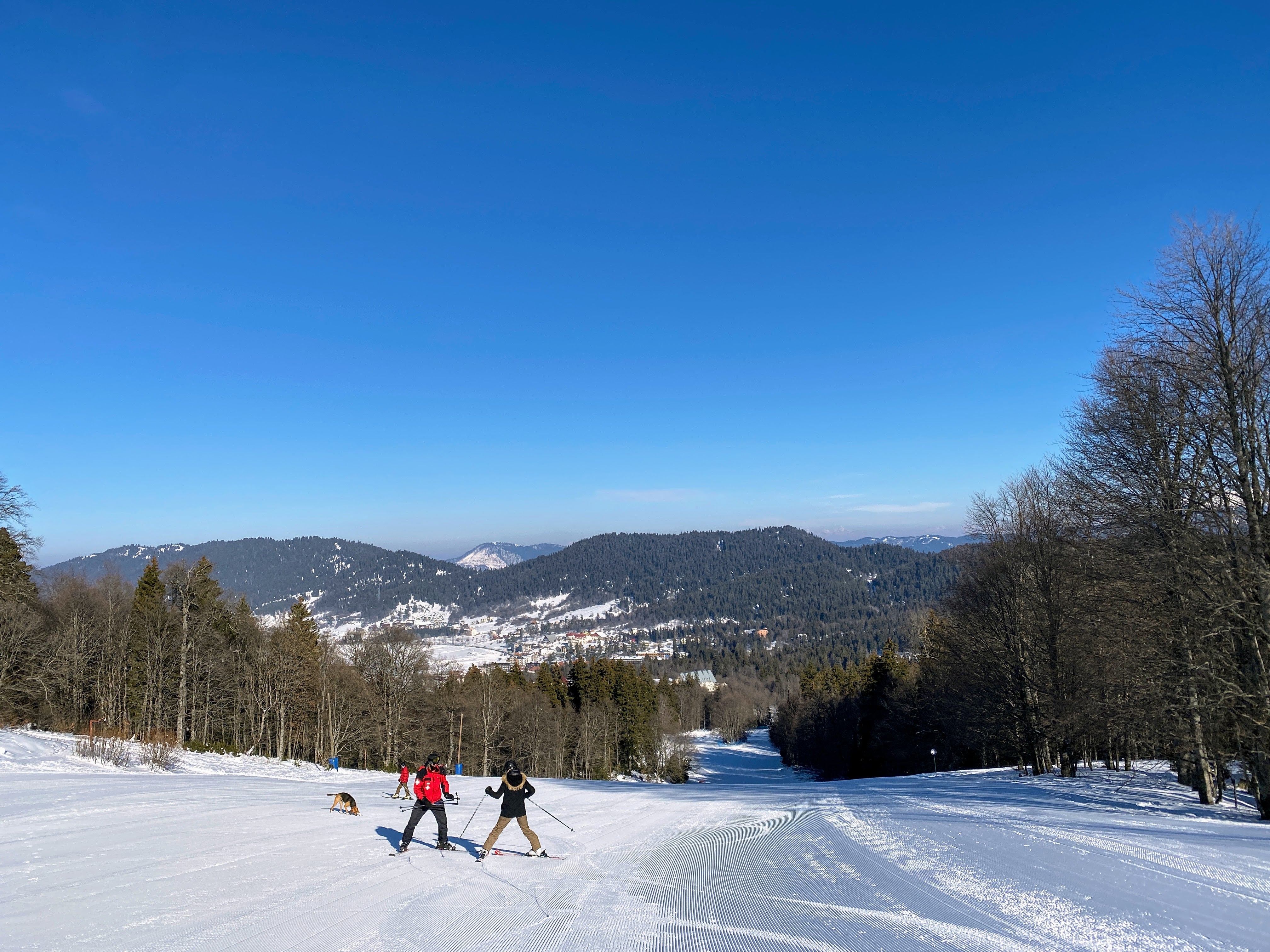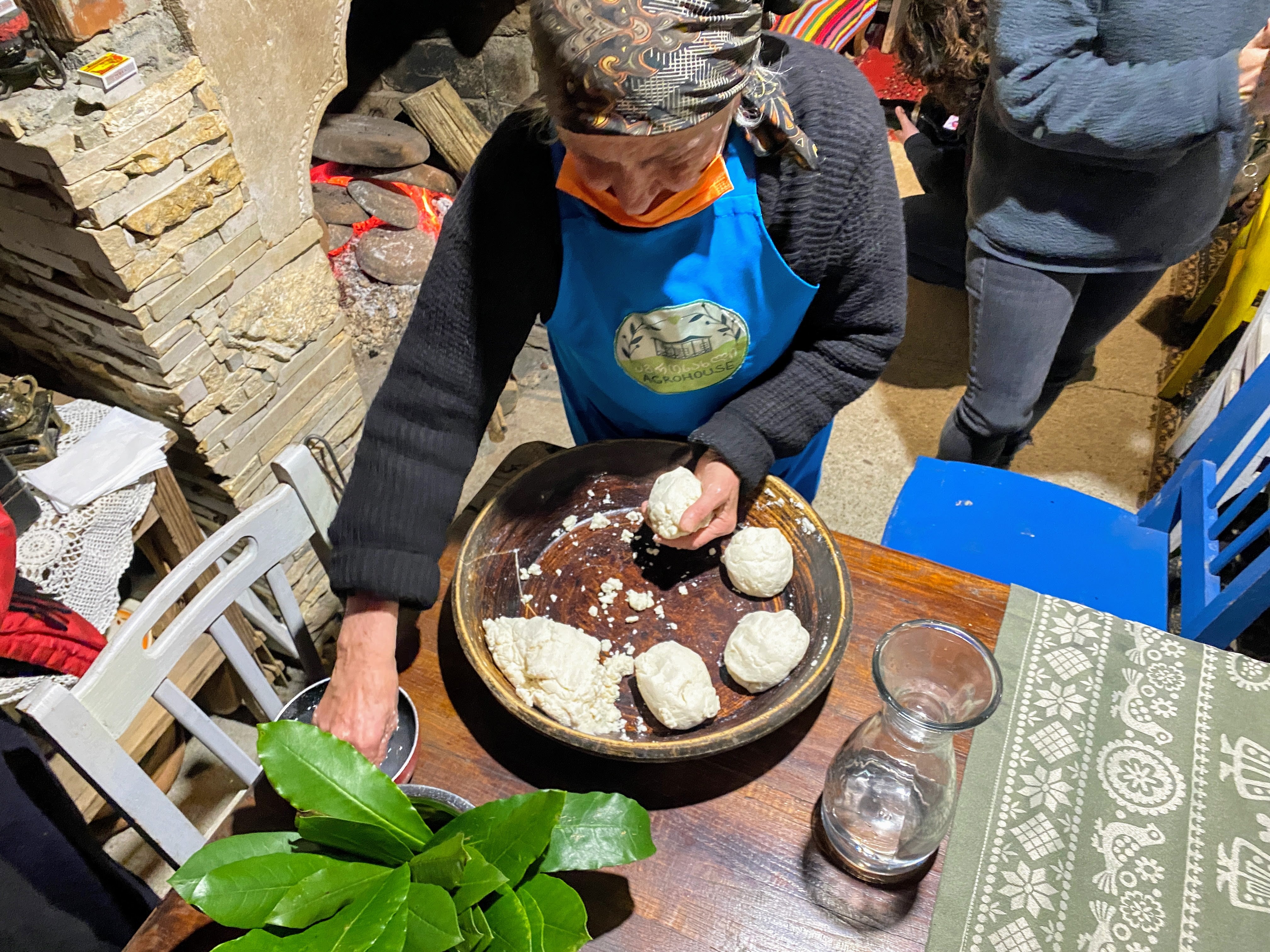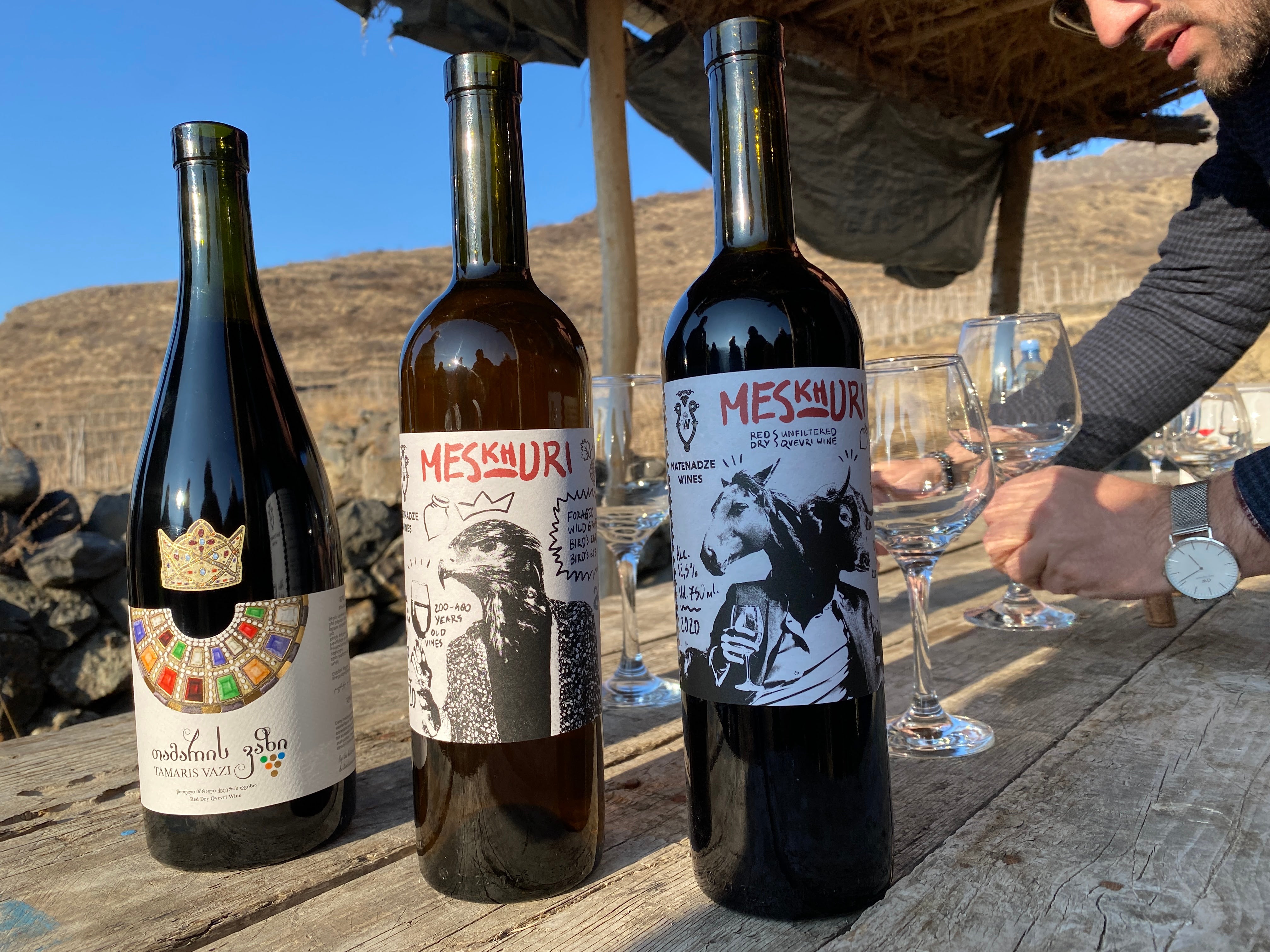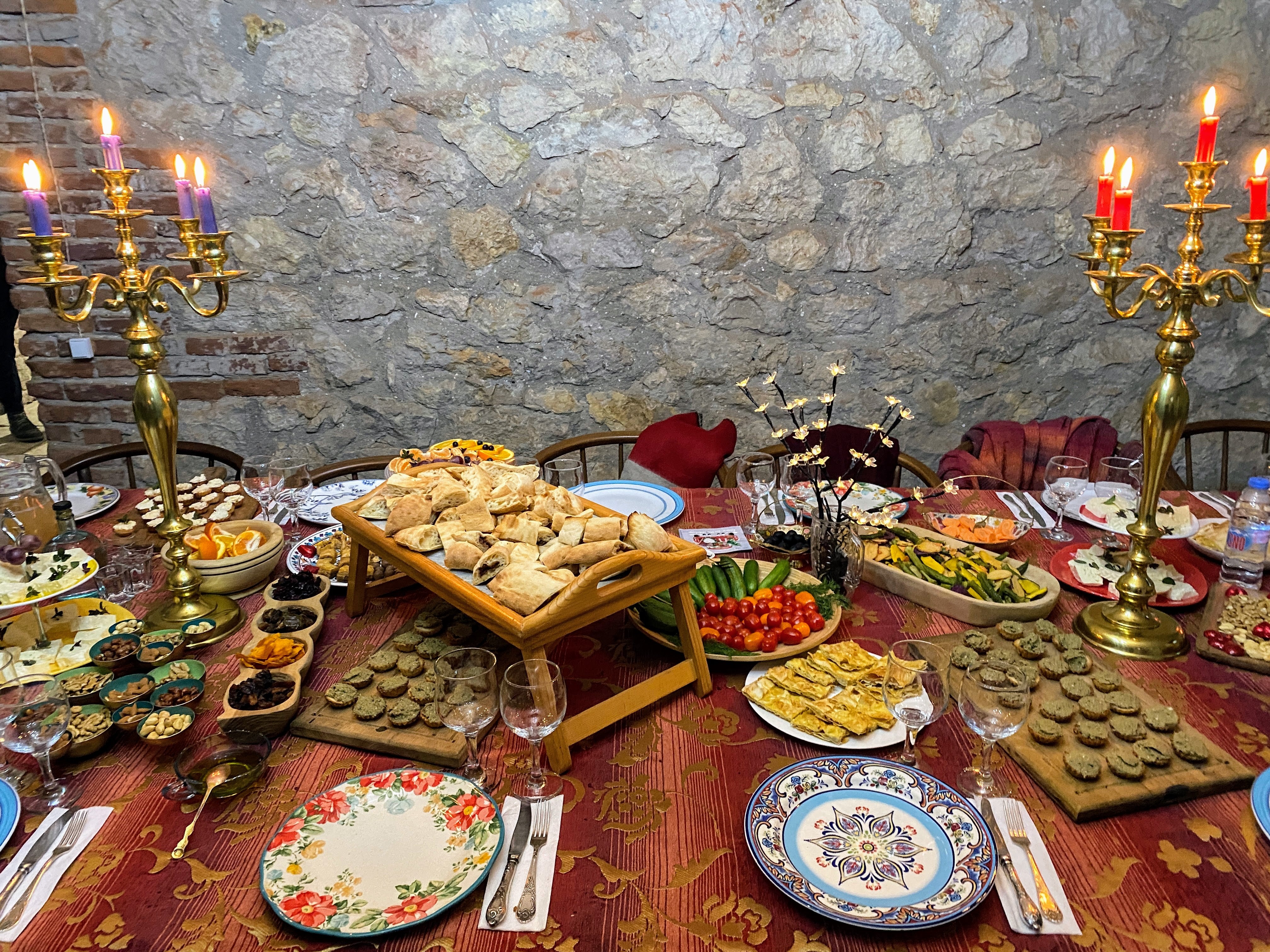Georgia on my mind: snow, saperavi and solidarity in the Caucasus
Megan Eaves goes in search of wine and wintry delights – and discovers the deep sense of community underpinning this country at the crossroads of Europe and Asia

At the top of Mount Kokhta, there is silence. The quiet is broken by a sharp, frigid breeze, but otherwise, the stillness is absolute. I stare across a valley ringed by snow-topped mountains. Spruce forests rise partway up, leaving the peaks frosted like cakes. Then, in a sudden rush, I’m off. Whoosh, whoosh, whoosh, whoosh. Scrape. I ski to a halt and this time hear a loud crack and thud as a mound of snow falls from a branch some distance down the slope.
The only other person on the piste is my German friend, who has been on skis since birth and puts my rusty, Rocky Mountain snow legs to shame as she effortlessly weaves down the mountain. The slopes here remind me of Colorado: wide, with packed powder groomed into a perfectly ridged crust. It’s -7C but the sun is out and the sky is a cloudless azure blue that meets the mountains like an upside-down ocean.
Georgia is not a country necessarily known for its skiing, though I can’t make out why. With the Caucasus cutting clean across its interior from the Black Sea to the Caspian in neighbouring Azerbaijan, a mountainous way of life defines this region. It’s easy to forget how high the Caucasus are. The tallest peak in the mountain range (and Europe) is massive Mount Elbrus at 5,642m, while Georgia’s highest, Mount Shkhara in the far north, stands at a towering 5,193m – 386m taller than the highest peak in the Alps, the mighty Mont Blanc (4,807m).

I’m at Bakuriani, a resort built in the 1930s, which now has 23 pistes and eight speedy, modern lifts spread across several peaks. These surround an ancient, volcanic caldera that forms the wide valley where the town sits.
As there aren’t any crowds, we zoom straight onto the lift, making run after glorious run. The sun rises high, softening the deep, February snowpack, and by midday, we are peeling off layers and looking longingly at a group of beer drinkers enjoying the lift-view terrace at the Rooms Hotel Kokhta.
Part of the homegrown Adjara Hospitality Group, Rooms has been making strides in Georgia as an affordable boutique hotel with sustainability and local sourcing at its core. In 2018, Adjara opened the celebrated Stamba Hotel in a former Soviet publishing house in the capital, Tbilisi, and it quickly became one of the city’s hotspots, with a well-regarded restaurant, trendy bar/coworking space and showstopping design that celebrates the publishing heritage with floor-to-ceiling bookshelves and golden, rolltop bathtubs in the deluxe rooms. The ski-in/ski-out property at Kokhta is Adjara’s latest offering and is surprisingly chic for a remote spot like Bakuriani.
The slopes here remind me of Colorado: wide, with packed powder groomed into a perfectly ridged crust
In the evening, I settle next to the fireplace in the Rooms bar to ease aching muscles with the house cocktail: gin, créme de mure, lime and berry purée garnished with a candied baby pinecone (a local speciality). The bar is humming with Georgian house music and beautiful people.
We started our journey a few days ago as most do, in the Georgian capital. A long, thin city set along both banks of the Mtkvari River, Tbilisi defies post-Soviet stereotypes with its maze of Anatolian-Caucasian townhouses made of clay brick, each with intricately carved, wood-lattice balconies.
“Balconies have always been our social spaces and the entry to homes. They are the centre of life in Tbilisi,” says our guide, Dato Nozadze. We huff up a steep, cobbled street from the Old Town, where sulphur springs have been harnessed into baths since the 5th century. Dato points to a brick structure standing between several dilapidated houses and tells us it is the Atashgah of Tbilisi, a Zoroastrian fire temple that has stood here since Georgia was part of the Persian empire in the 5th-7th centuries. It was later used as a mosque.

“The thing about my city is that it is very diverse,” Dato tells us. “There are all kinds of people living here together in a tolerant way. It’s because, historically, life was hard and a communal, loving culture was a way for us to survive.”
The communality of Georgian culture is utterly inescapable. From the extravagant supra (feast) with dozens of dishes (had twice a day, every day for all seven days of my visit), to deeply emotional dinner toasts and hyperlocal job initiatives in rural communities, Georgians seem hell-bent on taking care of each other – and all of their visitors – to an almost overwhelming degree.
Nowhere is this more evident than in the wine culture. You won’t spend five minutes in Georgia before someone tells you that wine has been made here for millennia. Georgian is a language-isolate (unrelated to any other language family) and some contend that Latin borrowed the Georgian word gvino, dropping the difficult-to-pronounce glottal sound at the beginning to form vinum.
In the evening, we meet for a big group dinner at Terracotta, a cosy, cellar restaurant founded by two women, Tata Samkharadze and chef Anna Burduli. We gather around an antique table with mismatched chairs surrounded by wooden shelves full of colourful ceramics made by Samkharadze’s parents, who formerly ran the space as a pottery studio.
Georgians seem hell-bent on taking care of each other – and all of their visitors – to an almost overwhelming degree
The wine is flowing from tall, glass carafes before we’re even seated, and Dato explains the importance of the toast in Georgia. Every supra is overseen by a tamada (toastmaster) and there is a deeply established toasting etiquette that involves long, rambling, emotional speeches throughout the meal.
Tonight’s tamada is jewellery maker Luarsab Togonidze, who we met earlier at his workshop and showroom, Kebzari, where he is reviving pre-Soviet jewellery traditions from all across Georgia into contemporary, wearable pieces.
“Wine is not only to satisfy your thirst. It is to make friends, and we have made many fantastic friends today,” he gushes before picking up a guitar and launching into a series of traditional ballads sung with his teenage daughter in astonishing polyphonic harmonies (such a unique part of Georgian tradition that this singing style has a place on the Unesco Intangible Cultural Heritage list).

Georgia has somewhere between 400 and 500 native grape varieties, including the famous saperavi used to make its favoured reds. Much of the wine made here is biodynamic, produced using only natural farming methods and often employing an ancient technique of ageing the wine in large, earthenware pots called qvevri. Some winemakers are taking this commitment to natural methodology to a wonderful extreme.
In Meskheti, in the far south near the Turkish border, we meet George Natenadze of Natenadze Wines. He is growing grapes using historical, terraced slopes and 400-year-old vines that he hand-forages in derelict villages in the area. George explains that the vines have been protected for centuries because they were grown on the trunks of mulberry trees. He grafts the ancient grapes onto American vine roots and makes boutique wines with astonishing depth and earthy, jammy flavours.
A few days later, we drive west to Gelati, a tiny village outside the city of Kutaisi, for dinner at Agrohouse Korena. Maia Kezevadze restored a 160-year-old stone farmhouse here and created a guesthouse that offers cooking workshops, suppers and farming experiences. When we arrive, flames are roaring in a huge stone fireplace, while the timber walls are hung with tapestries and woven blankets in burgundy and emerald green. The table is already set with glasses of straw-coloured wine, heaping bowls of salad and loaves of fresh bread. Maia is at the hearth making ketsi (cornbread) using endemic Black Sea rhododendron.
I wanted to create this house to bring people together for love and for food, and it’s happened, so my mission is accomplished
“I left the village and came back after 10 years,” she says as she rolls out dough for khachapuri (cheese-filled bread). “I wanted to create this house to bring people together for love and for food, and it’s happened, so my mission is accomplished.” She believes her farm is a good example of how tourism benefits local people. The agrohouse employs 14 people from the village who were previously in need of regular income, including 88-year-old Dali, who oversees our cooking workshop and supper.
We feast on lobio (bean stew), roast chicken and locally made soft cheese. After a few minutes, a traditional quartet begins to serenade us with polyphonic singing and folk instruments – the panguri and changuri (stringed, like lutes), duri (drum) and salamuri (recorder).
The singers’ dissonant lines of melody blend and reverberate bone-deep, filling the room up thick with emotion. During one slow ballad, Dato leans over and whispers that the song is about defeating the enemy in battle and saving Georgia and its people. At the end, I notice one of the singers quietly wiping away tears.
A few days after I leave Georgia, Russia invades Ukraine and tens of thousands of Georgians take to the streets in some of the largest protests the country has ever seen. After all, Georgians know first-hand what a Russian invasion is like – they have been invaded twice in modern times, in 1992 and 2008, in circumstances hauntingly similar to Ukraine. Travelling through Georgia today, remnants of the wars are everywhere – from Bakuriani mountainsides devastated by firebombing to people that continue to live lives displaced from their hometowns annexed by Russia. What strikes me is how little Georgians let these horrendous events deter them. Instead, they drink wine and eat feasts and look after one another, and aren’t afraid to sing, laugh and cry openly.

On my final day in Tbilisi, I go for a soak in the sulphur springs. Several bathhouses are clustered together around Abano Street in the old district, including locals’ favourite Gulo’s Thermal Spa. But I aim for the slightly more opulent Orbeliani Baths, in part because I love the Silk Road-like tiled exterior. Inside, I’m led down a marble corridor to a private room with a Roman-style soaking tub. A menu offers all manner of medicinal teas, alcoholic drinks and optional scrub treatments. Sinking into the steamy water, I think back over the week, which has felt like a month in the best possible way.
Maybe it was the soul-shaking dissonance of the polyphonic songs, the giant feasts or the heavenly mountain air. Perhaps it was the way that every Georgian I encountered so openly wore their emotions on their sleeves. Most likely, it was all the wine. But Georgia has me under its spell – and I will definitely be back.
Travel essentials
Getting There
Trying to fly less?
You can travel by train to Georgia via Istanbul by taking the Eurostar to Paris and riding the rails through Hungary, Romania and Turkey.
Fine with flying?
Pre-pandemic, there were direct flights from London to Tbilisi on Georgian Airways and to Kutaisi on Wizz Air. It is expected these will resume in 2022 but, in the meantime, Turkish Airlines offers flights to Tbilisi via Istanbul or you can fly through Munich on Lufthansa.
More information
Georgian Experience arranges bespoke tours starting from £830pp for four nights. Independent travellers can reach Bakuriani ski resort by train or taxi from Tbilisi. Rooms Kokhta arranges basic ski hire with advance notice, but better options are FreeStyler Shop or MPlus in Tbilisi, which both hire mid-range equipment for around £8 a day. All-day lift tickets at Bakuriani cost £9.50.
Subscribe to Independent Premium to bookmark this article
Want to bookmark your favourite articles and stories to read or reference later? Start your Independent Premium subscription today.
Join our commenting forum
Join thought-provoking conversations, follow other Independent readers and see their replies
Comments